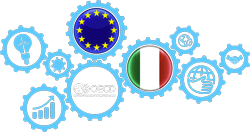Governance and Policy Coherence for the SDGs
Policy coherence for sustainable development: Mainstreaming the SDGs in Italian decision making
ReportThe OECD Italy Governance Scan for Policy Coherence for Sustainable Development provides a snapshot of how the Italian institutional arrangements and processes are fit for increasing policy coherence. Based on bilateral interviews with key Italian stakeholders – at national, regional and metropolitan level – and multi-stakeholder workshops with more than one hundred participants, the Scan underlines Italy's main strengths and weaknesses and provides key recommendations to address PCSD challenges. The next step of the project will be the production of the PCSD Action Plan which will feature as a key component of the 2021 Revision of the National Sustainable Development Strategy (NSDS). The key elements of the Italian governance setting are assessed along the eight OECD PCSD Recommendations in the Italian Country Profile |
|||
ObjectivesThe Technical Support Instrument of the European Commission is funding a project implemented in partnership with the OECD to support the Italian Ministry for Ecological Transition (MiTE, previously Ministry for Environment, Land and Sea Protection – MATTM) moving towards Policy Coherence for Sustainable Development (PCSD) by applying the OECD Recommendation on PCSD as guiding principle and tool. Further information can be found on the project webpage of the Italian Ministry for Ecological Transition: https://www.mite.gov.it/pagina/strategia-nazionale-lo-sviluppo-sostenibile |
|
||
How we work with Italy?
|
|||
Workshops and Events related to the project
The first virtual workshop on “Simulation of a coherent decision making process around 3 strategic objectives of the SNSvS Prosperity Area” was organised on 16 & 17 December 2020 and gathered 55 participants each day. Participants represented the central administrations (Ministry of Economy and Finance – MEF, Ministry of Foreign Affairs – MAECI, Presidency of the Council of Ministers – PCM , Department for Programming and Coordinating economic policies – DIPE); Metropolitan Areas (Turin, Genova, Reggio Calabria, Rome, Milan, Catania, Florence) and Regions (Friuli Venezia Giulia, Lombardia, Sardinia) as well as Civil society organisations (10 CSOs members of the Forum for Sustainable Development). The second virtual workshop titled “Establish institutional mechanisms for strengthening policy coherence between external and domestic policies” took place on 31 March, 2021 and contributed to identifying existing or potential provisions to be included in the revision of the NSDS (in particular section Partnerships) as well as policy coherence mechanisms to minimise negative effects on third countries to be included in the PCSD Action Plan. The workshop included over 70 participants from the central ministries, including the Italian Agency for Development Cooperation (AICS), sub-national Governments (Regions, Province Autonome, Metropolitan Areas), the European Commission, as well as civil society organisations and non-state actors, members of the Forum for Sustainable Development and of the National Development Cooperation Committee (CNCS). The third and last virtual workshop on “Connecting the existing evaluation and monitoring mechanisms related to sustainability within the revision of the National Sustainable Development Strategy (NSDS) and towards the PCSD Action Plan” took place on 17 June, 2021. The workshop investigated the existing evaluation and monitoring mechanisms for sustainability, coherence matrixes that have been applied to streamline policy packages with the NSDS and effort to align ex-ante regulative assessments (i.e. CIPESS investment evaluation, Strategic Environmental Assessments, etc.) to take into account sustainability considerations. The exchanges during this workshop will contribute to both: the ongoing work for updating the NSDS indicators and the formulation of the PCSD Action Plan. The event gathered over 60 participants from different Ministries, civil society organisations and local authorities (Regions and Metropolitan Cities). On 17 June 2022 The Ministry for Ecological Transition (MiTE), the OECD, benefitting from the presence of the Director General of the DG Reform of the EU Commission presented Italy’s National Action Plan for Policy Coherence for Sustainable Development (PCSD Action Plan). The PCSD Action Plan includes actions and targets to strengthen and upgrade existing institutional mechanisms, policy formulation, monitoring and budgeting processes throughout the policy cycle in order to adopt a PCSD approach to decision-making. The OECD and MiTE drafted a Monitoring and Evaluation framework to report on the implementation of the PCSD action plan as it will be rolled out. Italy’s PCSD Action Plan is the first example of this kind and it results from a two-year whole of government and multi-stakeholder process. The PCSD Action plan is embedded in the National Sustainable Development Strategy 2022 NSDS/SNSvS revision proposal to be approved by the Interministerial Committee for Ecological Transition (CITE) and it constitutes its reference implementation approach. Meeting Recording / Final Agenda Highlights: Italy's National Action Plan for Policy Coherence for Sustainable Development Full Report: Italy's National Action Plan for Policy Coherence for Sustainable Development Presentation: M&E Framework Presentation: Mainstreaming the SDGs in the Italian decision making process The PCSD action plan has been equally presented during two important national events: on 24 June 2022 during the Italian national conference for Development Co-operation (COOPERA) [Event Programme]and on 21 June 2022 during the Italian National Conference for Sustainable Development [Event Agenda].
|
|||
Facts about Italy and the SDGs
|
| This project was funded by the European Union via the Structural Reform Support Programme and implemented by the OECD, in cooperation with the European Commission's Directorate General for Structural Reform Support (DG REFORM) |  |
Related Documents
- Romania: Strengthening Institutional Mechanisms to deliver on the SDGs
- Malta: 2050 Sustainable Development Strategy for Malta and Action Plan
- Strengthening institutional mechanisms and capacities for policy coherence in Luxembourg to deliver on the SDGs at home and abroad
- Poland: Building civil service capacity for delivering on the SDGs
- Poland